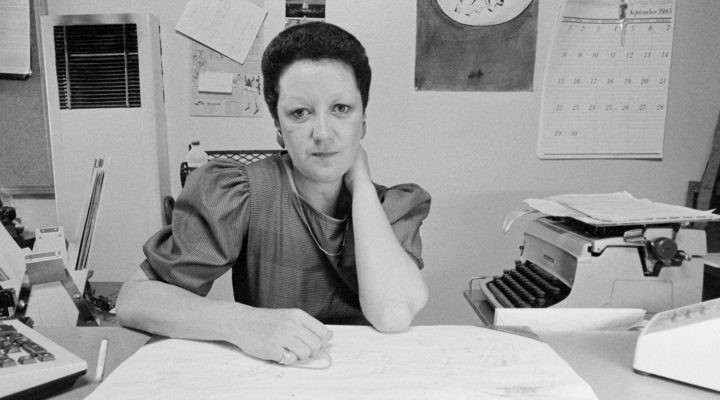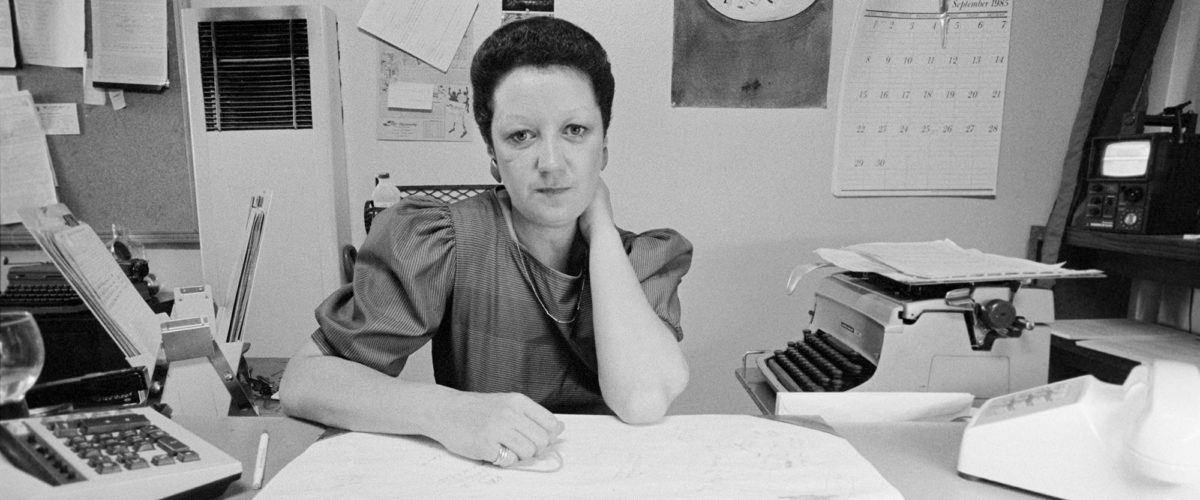Joshua Prager has written what critics are calling the definitive book on Norma McCorvey, her family and the landmark Supreme Court decision she sparked that’s once again at the center of public attention, Roe v. Wade.
The Family Roe: An American Story has been hailed in both the Wall Street Journal and The New York Times alike.
Prager’s decade spent researching the backstory few Americans ever knew led him to build relationships with some of the key players, including other members of the McCorvey family.
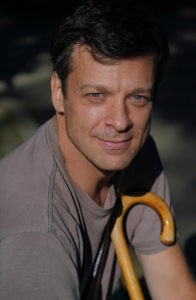
Joshua Prager
His journey started with reading a news article that said the anonymous Jane Roe of Roe v. Wade ended up not having an abortion despite winning the Supreme Court case.
“The case took too long for her to be able to have an abortion,” he explained. “So when I realized there was a child turned grown-up who had been born, I said, ‘Wow! That would be quite a burden to carry, if that person knew who their birth mother was.’ So, I set out to look for them, and I found them. And that was the beginning of this enormous 11-year odyssey.”
Every family has roots and secrets they hope to hide, but Prager believed investigating the roots of Baby Roe could lead to a greater national understanding of the history of how we got here and why we still wrestle with the landmark decision on abortion. As a professional journalist, he does not share his personal opinions on Roe v. Wade. His intent has been to tell the stories of the family dynamics and the backgrounds of the key players involved with the case.
Prager is a former senior writer for the Wall Street Journal, was a Nieman Fellow at Harvard and is a Fulbright Distinguished Chair at Hebrew University. He lives in New Jersey with his wife and two daughters.
Prior to reading that one news article, he never had thought of the fact that Baby Roe had been born and might have a story to tell. Prager became the first journalist to interview Baby Roe, whose real name is Shelley Thornton. Prager also learned that Thornton’s relationship with her biological mother was estranged. The two had spoken on the phone.
Prager became the first journalist to interview Baby Roe, whose real name is Shelley Thornton.
This became more than just a story to Prager as he immersed himself with the family while getting to know Norma’s two other biological children first.
“I got to know Norma because when I found out who Baby Roe was, I also found her two biological half-sisters, who were the other two children Norma had given birth to and relinquished to adoption. I got to know all three of them through going to the funeral of their biological grandmother. Two of the three of those daughters were at the funeral. Norma showed up, and Melissa, the eldest of the three daughters, said, “Hey, mom, I would like you to speak with Josh.”
That began Prager’s conversation with Norma, which led to his extensive insight into why the family dynamics were estranged due to the complexities of Roe v. Wade.
None of this is a simple story. The book runs 672 pages.
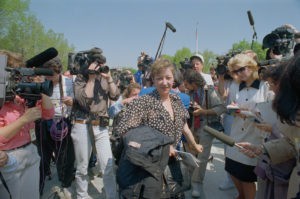
In the 1990s, Norma McCorvey, “Jane Roe” in Roe v. Wade, became the center of media attention after arguments in a Missouri abortion case at the Supreme Court. McCorvey attended the session as a spectator. (Getty Images)
“When I started to get to know her, she was incredibly complicated and conflicted about abortion,” Prager explained. “As many people are actually in the middle, she too occupied that majority and middle ground that so many Americans believe in.
“They say, ‘Hey, I don’t think abortion should always be legal. I don’t think abortion should never be legal. Rather, I think abortion ought to be illegal sometimes.’”
He notes that support for abortion in America drops significantly with each additional trimester.
“Norma believed abortion ought to be legal through the first trimester,” he said. “As she opened up to me little by little, her story was very complicated and a sad story of how she came to those beliefs and how her life was remarkable.”
He also had to sort out truth from fiction in what she told him. “For example, that she had been raped and that she had been shot at because she was getting robbed, or that her mother had kidnapped her, or the abortion clinic stories of her working in the clinics and seeing the blood and process play out. But none of those things were true.”
Also complicated is the pivotal story of Norma’s later-in-life conversion to evangelical Christianity and whether she was paid to convert and to assume a role as an anti-abortion speaker.
“Norma was not paid a cent to convert,” Prager insists. “I had her taxes. What is true is that she knew that by becoming pro-life she would now be able to speak to a new large group of people who would pay her to speak. But it is not true that she was paid.
Also complicated is the pivotal story of Norma’s later-in-life conversion to evangelical Christianity and whether she was paid to convert and to assume a role as an anti-abortion speaker.
“Her conversion had elements that were very true and genuine and others that were a little less. For example, Christianity was a genuine comfort to her, particularly after she became Catholic. She loved to use rosary beads and she prayed to the patron saints. She had been an evangelical Christian for a time.
“Norma was very upset with the pro-choice community, which was in part why she left it,” he added. “They didn’t give her a seat at the table, and they marginalized her. She wasn’t from the same background that they were from, and there was unfortunately an element of classism there. She felt patronized and not taken seriously. She felt as though if she were to leave them, then they would have to take her seriously. And she did that, and she was right.”
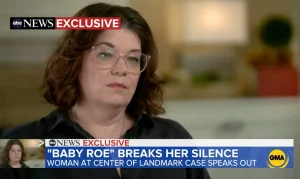
Shelley Thornton on Good Morning America.
Norma’s relationship with her biological daughter Shelley was equally complex. And the former Baby Roe has her own convictions about the issue of abortion.
Prager explained that during his research, he reached out to Shelley’s adoptive mother and her mother confirmed she knew about Norma. “When Shelley was almost 19 years old, the National Inquirer tabloid had come upon her in a parking lot, told her who she was and told her they were going to write an article about her whether she wanted them to or not. They did that, and they did withhold her name.”
Yet the trauma of carrying that secret and not wanting to be seen as a symbol of support for abortion haunted her.
“She didn’t want to be seen as the living argument against abortion in … the way the pro-life community looked at her. She wanted to just be her own person. That is how she continues to feel until this day, which is very understandable.”
The complexities of religion also play into Prager’s book.
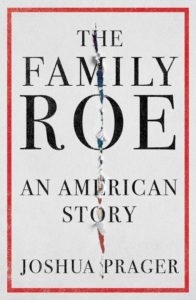 “Religion is something I write about a lot in the book,” he said. “Some of the religious leaders treated Norman beautifully, and some did not. I guess religious people are like everyone else. Some do the right thing, and some don’t, and religion at its best offered Norma incredible support. But at its worst, she could not be who she wanted to be.”
“Religion is something I write about a lot in the book,” he said. “Some of the religious leaders treated Norman beautifully, and some did not. I guess religious people are like everyone else. Some do the right thing, and some don’t, and religion at its best offered Norma incredible support. But at its worst, she could not be who she wanted to be.”
Further complicating the story is that for a period of time, Norma “was in a committed lesbian relationship,” the author added. “Among other things, she was a gay woman. She (later) renounced her homosexuality, and that took a great toll on her at the same time she found great comfort in religion. So, like everything else in her life, it’s very complicated.”
According to Prager’s research, the father of Baby Roe, Billy Wheaton, died never knowing his role in American history.
Norma McCorvey died of cardiac arrest in Katy, Texas, on Feb. 18, 2017.
Prager was with Norma at the end of her life and describes the ending of her life as sad.
“It’s ultimately a very sad story at the end of her life. What is beautiful and sort of heroic is that the eldest child, Melissa, decided that even though her mother Norma had not been there for her and had not wanted to be a mother to her, she would take care of her at the end. She was there for her biological mother right at the end of her life.”
Maina Mwaura is a freelance writer based in Atlanta.
Related articles:
Roe v. Wade in real time | Opinion by Kathy Manis Findley
Talking about abortion is an opportunity to call on the grace of Jesus Christ | Opinion by Erin Jean Warde
SBC calls for ‘immediate abolition of abortion without exception or compromise’
When being ‘pro-life’ really isn’t: How I became a Democrat who opposes abortion | Analysis by Chris Conley
When your religion goes against my religion | Opinion by David Bumgardner

